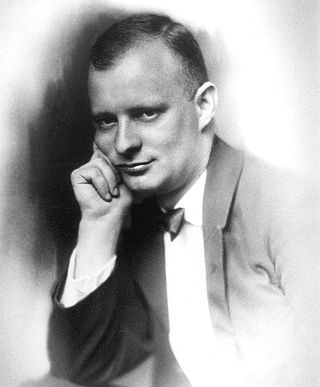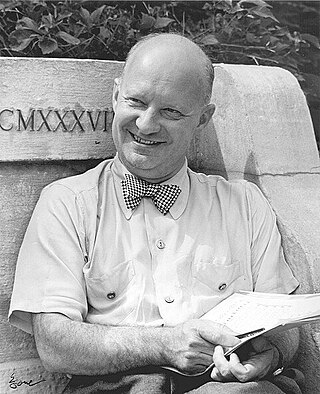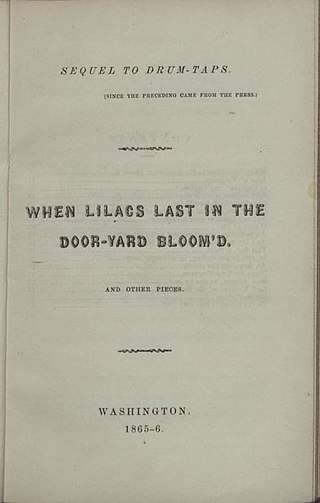Related Research Articles

Paul Hindemith was a German and American composer, music theorist, teacher, violist and conductor. He founded the Amar Quartet in 1921, touring extensively in Europe. As a composer, he became a major advocate of the Neue Sachlichkeit style of music in the 1920s, with compositions such as Kammermusik, including works with viola and viola d'amore as solo instruments in a neo-Bachian spirit. Other notable compositions include his song cycle Das Marienleben (1923), Der Schwanendreher for viola and orchestra (1935), the opera Mathis der Maler (1938), the Symphonic Metamorphosis of Themes by Carl Maria von Weber (1943), and the oratorio When Lilacs Last in the Dooryard Bloom'd (1946), a requiem based on Walt Whitman's poem. Hindemith and his wife emigrated to Switzerland and the United States ahead of World War II, after worsening difficulties with the Nazi German regime. In his later years, he conducted and recorded much of his own music.

Leaves of Grass is a poetry collection by American poet Walt Whitman. Though it was first published in 1855, Whitman spent most of his professional life writing, rewriting, and expanding Leaves of Grass until his death in 1892. Six or nine individual editions of Leaves of Grass were produced, depending on how they are distinguished. This resulted in vastly different editions over four decades. The first edition was a small book of twelve poems, and the last was a compilation of over 400.
John Harris Harbison is an American composer and academic.

Jennifer Elaine Higdon is an American composer of contemporary classical music. She has received many awards, including the 2010 Pulitzer Prize for Music for her Violin Concerto and three Grammy Awards for Best Contemporary Classical Composition for her Percussion Concerto in 2010, Viola Concerto in 2018, and Harp Concerto in 2020. Elected a Member of the American Philosophical Society in 2019, she was a professor of composition at the Curtis Institute of Music from 1994 to 2021.

"When Lilacs Last in the Dooryard Bloom'd" is a long poem written by American poet Walt Whitman (1819–1892) as an elegy to President Abraham Lincoln. It was written in the summer of 1865 during a period of profound national mourning in the aftermath of the president's assassination on 15 April of that year.

When Lilacs Last in the Dooryard Bloom'd: A Requiem for those we love(An American Requiem) is a 1946 oratorio by composer Paul Hindemith, based on the poem of the same name by Walt Whitman. It is the first musical work to include the entirety of Whitman's 1865 poem. Conductor Robert Shaw and the Robert Shaw Chorale commissioned the work after the 1945 death of President Franklin D. Roosevelt. It received its world premiere on May 14, 1946, at New York City Center, with the Collegiate Chorale conducted by Shaw and soloists Mona Paulee, contralto, and George Burnson, baritone. Paulee performed the work again with bass-baritone Chester Watson and the CBS Symphony Orchestra for the work's first recorded broadcast on CBS Radio on June 30, 1946.
The First Symphony of the German composer Karl Amadeus Hartmann was completed in 1955.
Jennifer Higdon's Concerto for Violin and Orchestra was written in 2008. The work was jointly commissioned by the Indianapolis Symphony Orchestra, the Toronto Symphony Orchestra, the Baltimore Symphony Orchestra, and the Curtis Institute of Music. It was composed for the violinist Hilary Hahn and was given its world premiere by Hahn and the Indianapolis Symphony Orchestra under the conductor Mario Venzago on February 6, 2009. The piece was later awarded the 2010 Pulitzer Prize for Music.
Lilacs for voice and orchestra is a musical composition by George Walker that was awarded the 1996 Pulitzer Prize for Music. The work, scored for soprano soloist and orchestra, was the unanimous choice of the Pulitzer prize jury. Walker was the first African-American composer to be awarded the prize.
Curtis Curtis-Smith, better known as C. Curtis-Smith or C.C. Smith, was a modernist American composer and pianist.

Sequel to Drum-Taps: When Lilacs Last in the Dooryard Bloom'd and other poems is a collection of eighteen poems written and published by American poet Walt Whitman in 1865.
Elegiac Ode, Op. 21, is a musical composition by British composer Charles Villiers Stanford (1852–1924) written and first performed in 1884. It is a four-movement work scored for baritone and soprano soloists, chorus and orchestra, Stanford's composition is a setting of Walt Whitman's 1865 elegy, "When Lilacs Last in the Dooryard Bloom'd", mourning the death of American president Abraham Lincoln. According to musicologist Jack Sullivan, Stanford's Elegiac Ode likely had reached a wider audience during Whitman's lifetime than his poems.
The Concerto for Orchestra is an orchestral composition in five movements by the American composer Jennifer Higdon. The work was commissioned by the Philadelphia Orchestra with contributions from the National Endowment for the Arts, the Philadelphia Music Project, and Peter Benoliel. It was premiered at the Kimmel Center for the Performing Arts in Philadelphia June 12, 2002, with conductor Wolfgang Sawallisch leading the Philadelphia Orchestra.
Fanfare Ritmico is a single-movement orchestral composition by the American composer Jennifer Higdon. The work was commissioned by The Women's Philharmonic as part of The Fanfares Project. It was given its world premiere in March 2000 by conductor Apo Hsu and the Women's Philharmonic.
Loco is an orchestral composition in one movement by the American composer Jennifer Higdon. The work was commissioned by the Ravinia Festival of Highland Park, Illinois to commemorate the Ravinia train as part of the Train Commission Project. It was first performed on July 31, 2004, at the Ravinia Festival by the Chicago Symphony Orchestra.
The Singing Rooms is a concerto for solo violin, choir, and orchestra by the American composer Jennifer Higdon. The work was jointly commissioned by the Philadelphia Orchestra, the Atlanta Symphony Orchestra, and the Minnesota Orchestra. It was first performed on January 17, 2008 in Philadelphia by the violinist Jennifer Koh, The Philadelphia Singers, and the Philadelphia Orchestra under the conductor Christoph Eschenbach. The text of the piece is set to poems by Jeanne Minahan. The piece was most recently done in March 2019 at the Kimmel Center for Performing Arts in Philadelphia by the Temple University Choirs and Orchestra, with a featured violin soloist.
On the Death of the Righteous is a composition for choir and orchestra set to the text of John Donne by the American composer Jennifer Higdon. The work was commissioned by the Mendelssohn Club in 2009 to celebrate Alan Harler's 20th season as their music director. The piece was first performed on March 29, 2009, by the Mendelssohn Club orchestra and choir under the conductor Alan Harler.
blue cathedral is an orchestral composition by the American composer Jennifer Higdon. The work was commissioned by the Curtis Institute of Music in 1999 to commemorate the conservatory's 75th anniversary. It was first performed in 2000 by the Curtis Institute of Music Symphony Orchestra. The piece is dedicated to the memory of Higdon's brother and is one of the composer's most performed works.
The Harp Concerto is a composition for harp and orchestra by the American composer Jennifer Higdon. It was commissioned by the Rochester Philharmonic Orchestra, Harrisburg Symphony Orchestra, Baton Rouge Symphony Orchestra, Fargo-Moorhead Symphony Orchestra, Lansing Symphony Orchestra, and the Oklahoma City Philharmonic. The work was completed in early 2018 and was given its world premiere at the Eastman Theatre in Rochester, New York, by the harpist Yolanda Kondonassis and the Rochester Philharmonic Orchestra under the conductor Ward Stare on May 10, 2018. The piece is dedicated to Yolanda Kondonassis.
References
- 1 2 3 Higdon, Jennifer (2004). Dooryard Bloom: Program Note Archived March 4, 2016, at the Wayback Machine . Retrieved July 28, 2015.
- 1 2 Higdon, Jennifer (January 15, 2006). "Jennifer Higdon's 'Dooryard Bloom'". NPR . Retrieved July 28, 2015.
- 1 2 Kozinn, Allan (April 18, 2005). "A Celebration of Brooklyn, via Whitman". The New York Times . Retrieved July 28, 2015.
- ↑ Taubman, Howard (May 15, 1946). "Work by Hindemith in World Premiere; Requiem Based on Whitman Elegy Heard at City Center — Collegiate Chorale Excels". The New York Times . Retrieved July 28, 2015.
- ↑ Smith, Steve (April 24, 2013). "Dark Songs Pierced With Rays of Cheer". The New York Times . Retrieved July 28, 2015.
- ↑ Stearns, David Patrick (April 19, 2005). "Works by Jennifer Higdon". The Philadelphia Inquirer . Archived from the original on June 11, 2011. Retrieved July 28, 2015.
